The following is a media release from Sen. Elizabeth Warren’s office. She was elected by voters in the Commonwealth of Massachusetts to serve the state in Washington DC in the US Senate. She is a Democrat.
***
[broadstreet zone=”51611″]
WASHINGTON DC – United States Senator Elizabeth Warren (D-Mass.), a member of the Senate Health, Education, Labor, and Pensions (HELP) Committee, introduced yesterday, December 22, the Expanding COVID-19 Testing Capacity Act of 2020, which would require the federal government to manufacture and distribute COVID-19 diagnostic tests to community centers, congregate care settings, schools, and childcare facilities, religious centers, prisons and jails, businesses that employ essential workers, and other qualified locations across the country for the purpose of expanding Americans’ access to free COVID-19 testing.
“It’s long past time that the federal government throws real muscle behind controlling and mitigating the spread of COVID-19, and investing in and implementing aggressive testing measures are a critical part of this effort. Even as vaccine distribution begins, testing will remain a critical tool in reducing rates of COVID-19 infections. High-quality and frequent COVID-19 testing should be easily available to all Americans, and this is why I’m glad to be introducing legislation to ensure that our nation has expanded access to federally funded testing,” said Senator Warren.
[broadstreet zone=”59982″]
“For many months, physicians with a frontline view of the devastation caused by the pandemic have been calling for federal support to enable broader testing. A strong national testing framework is a critical component of an optimal COVID-19 mitigation strategy, and we applaud Senator Warren for her leadership in introducing this thoughtful bill,” Massachusetts Medical Society president Dr. David A. Rosman said. “We are especially pleased by provisions that require test results to be delivered in 24 hours, provide free testing to a wide range of workers regardless of their symptoms, ensure transparency on spending and distribution of tests, and account for evolving needs and changes in testing technology,”
Nearly 20 million Americans have contracted COVID-19, and over 300,000 have died. Though vaccine distribution has begun, public health experts have warned that the coming months will be “the darkest days of the pandemic” in the U.S. To get the virus under control, experts have called for aggressive COVID-19 testing, and leadership of the National Institutes of Health has called for testing “as many people as possible.” But the nation is not conducting nearly enough tests to stop the spread of the virus. Though the nation’s testing capacity has drastically improved since the start of the pandemic, the U.S. is only conducting roughly 2 million daily tests. More testing capacity is necessary: labs are experiencing processing delays and struggling to access materials-like pipette tips-they need to conduct tests. The federal government has yet to provide the resources necessary to mitigate testing shortages.
[broadstreet zone=”59984″]
To ensure that the nation has the testing capacity it needs, the Expanding COVID-19 Testing Capacity Act of 2020 would:
- Require the federal government to publicly manufacture diagnostic tests and testing supplies. The Department of Health and Human Services (HHS) would stabilize the testing supply chain by manufacturing, or contracting for the manufacture of, diagnostic tests and associated medical products (like personal protective equipment, reagents, and pipette tips) and providing those products free of charge to state, local, territorial, and tribal health care providers and programs.
- Test essential workers, students and teachers, residents and employees at congregate facilities, and others for COVID-19. The bill requires the federal government to distribute COVID-19 tests to qualified entities like schools, nursing homes, homeless shelters, and factories for the purpose of providing free testing to individuals at highest risk of COVID-19.
- Provide federal employees with free COVID-19 tests. The federal government would provide employees unable to socially distance or telework in the course of their jobs with free COVID-19 tests for the duration of the pandemic.
- Invest an additional $25 billion in state, local, territorial, and tribal testing systems to strengthen existing infrastructure, develop new testing sites, and reduce testing disparities.
- Ensure individuals hired or employed using funding provided by the bill have access to critical labor protections, including a $15 minimum wage and overtime pay.
- Require HHS, acting through the Food and Drug Administration, to issue a series of guidance and reports designed to expedite the approval of COVID-19 diagnostic tests and provide resources on testing program best practices.
- Collect demographic data on COVID-19 tests administered through the bill to gather the information necessary to reduce disparities in COVID-19 outcomes.
[broadstreet zone=”70106″][broadstreet zone=”70107″]

